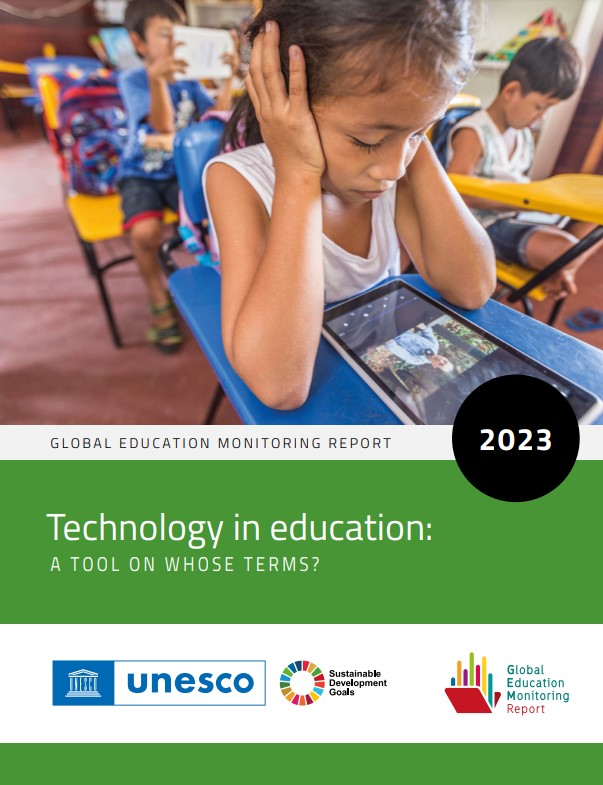
* Technology in education : a tool on whose terms?
□ 유네스코는 학내 스마트폰 사용 금지 촉구는 인공지능(AI)을 포함한 디지털 기술이 '교육의 인간 중심적 비전'에 충실해야 하며 '교사와의 대면 상호작용을 대체해서는 안 된다'는 메시지를 보낸 것이라고 밝혔음. 유네스코는 보고서를 통해 '각국이 교육에서 디지털 기술의 활용에 분명한 목적과 원칙을 둬야 한다'고 촉구함
□ 보고서 주요 내용
ㅇ 교실이나 가정에서 스마트폰, 태블릿, 노트북 등을 과도하게 사용할 경우 교육 성과 감소 우려
ㅇ 대규모 국제 조사 결과 디지털 기술의 과도한 사용과 학습 능력 사이에는 부정적인 상관관계 존재
ㅇ 학습 결과물이나 경제적 효율성에 대한 디지털 기술의 긍정적 영향은 과장되기 쉬우므로, 정책 담당자들이 디지털 기술을 함부로 수용해서는 안 된다고 경고
ㅇ 대학에서 학습의 중심이 온라인으로 넘어가는 상황에서 학생들이 대면 교육을 받을 수 있는 교육의 사회적 차원을 소홀히 해서는 안 된다고 촉구
ㅇ 디지털 교육 기반시설은 돈이 많이 들기 때문에 전 세계의 가난한 사람들은 그 기회를 누리지 못하는 불평등 문제 발생
ㅇ 디지털 교육 기반시설이 환경에 미치는 악영향에 대해 과소평가되는 경향이 있음
ㅇ 200개 국가 교육 시스템 분석 결과 6개국 중 1개국 꼴로 법이나 지침 등의 형태로 학교에서 스마트폰을 금지하고 있음
□ 오드리 아줄레 유네스코 사무총장은 “디지털 혁명은 무한한 잠재력을 지니고 있지만 그것이 사회에서 어떻게 규제돼야 하는지에 대한 경고의 목소리가 나오는 것과 마찬가지로 교육에서 어떻게 사용되는 것이 바람직한지에 대해서도 관심을 기울여야 한다”고 언급함. 그는 “디지털 기술은 학습 경험 향상과 학생 및 교사의 복지를 위해 사용돼야 한다”면서 “학습자의 필요를 우선적으로 고려하고 교사를 지원해야 한다”고 밝혔음
[출처]
유네스코, '학습·정서 악영향' 학교내 스마트폰 제한 권고 (2023.07.26.) / 연합뉴스
유네스코, 학내 스마트폰 금지 촉구···“학습 능력 저하, 정서적 악영향” (2023.07.26.) / 경향신문
[관련 자료] 교육 분야에서의 기술 : 누구를 위한 도구인가? : 세계 교육 현황 보고서 요약본 2023 (2023.10.15.) / 유네스코한국위원회
목차
Short summary v
Foreword vii
Acknowledgments x
Contents xiii
Technology in education 1
Chapter 1 Introduction 5
Can technology help solve the most important challenges in education? 9
How do we know whether technology works in education? 11
What do countries focus on when they invest in education technology? 14
Guide to the report 22
Recommendations 23
Chapter 2 Equity and inclusion: Access for disadvantaged groups 25
Multiple technologies bring education to hard-to-reach learners 28
Inclusive technologies support accessibility for students with disabilities 35
Technology supports learning continuity and system resilience in emergencies 38
Conclusion 42
Chapter 3 Equity and inclusion: Access to content 43
Technology facilitates content creation and adaptation 46
Digitization simplifies content distribution channels 50
Open access resources help overcome various barriers 54
Technology use to increase access to content faces challenges 55
Conclusion 62
Chapter 4 Teaching and learning 63
Technology’s potential to teaching needs to be shown in practice 66
Technology is not used very extensively for teaching and learning 68
Evidence on technology’s impact on learning is mixed 70
Digital technologies appear to improve student engagement 75
Intensive technology use negatively impacts student performance and increases disruption 81
Conclusion 82
Chapter 5 Digital skills 83
The definition of digital skills must be broad 86
Digital skills are hard to measure 90
Digital skills are acquired in formal education and outside it 97
Countries have developed various ways to build digital skills 100
Conclusion 105
Chapter 6 Education management 107
Technology can support the management of large volumes of education information 110
Lack of confidence and capacity constrain technology use in education management 118
Conclusion 120
Chapter 7 Access to technology: equity, efficiency and sustainability 121
Access to technology is unequal 124
Countries follow various policies to improve access to technology 128
Evidence needs to drive equitable, efficient and sustainable technology solutions 135
Conclusion 140
Chapter 8 Governance and regulation 141
Governments find it challenging to govern education technology 144
Digital privacy, safety and well-being need to be regulated 147
Conclusion 158
Chapter 9 Teachers 159
Technology-based practices and resources are changing the teaching profession 162
Various barriers prevent teachers from making the most of what technology can offer 164
Education systems are taking steps to help teachers develop their capacity167
Conclusion 176
Chapter 10 Education and technology development 177
Technology features in most secondary education programmes 180
STEM quality determines student aspirations and achievement 182
Higher education institutions are key to national technological development 188
Conclusion 194
Monitoring education in the Sustainable Development Goals 195
Chapter 11 Introduction 197
The national SDG 4 benchmarking process has reached a milestone 200
Following up on the Transforming Education Summit commitments 202
Highlights of the 2023 GEM Report monitoring part 205
The GEM Report is more than just a report 206
Chapter 12 Primary and secondary education 209
Access and completion 211
Learning 218
Focus 12.1: (How) do writing tools and techniques matter? 222
Focus 12.2: Healthy school meals are key to universal education and learning 223
Chapter 13 Early childhood 227
Focus 131: Active play outdoors is missing from early childhood education 235
Chapter 14 Technical, vocational, tertiary and adult education 237
Focus 14.1: Will micro-credentials challenge traditional higher education degrees? 241
Chapter 15 Skills for work 245
Focus 15.1: Artificial intelligence technology is expected to shift skill demand and supply 251
Chapter 16 Equity 255
Focus 16.1: First-generation students have it hard everywhere 263
Chapter 17 Youth and adult literacy 267
Focus 17.1: Does reading speed matter? 273
Chapter 18 Sustainable development and global citizenship 275
Focus 18.1: All learning is social and emotional 279
Chapter 19 Education facilities and learning environments 283
Focus 19.1: School buildings are technology 289
Focus 19.2 Can solar power close the school electrification gap? 292
Focus 19.3: Technology and the school commute 293
Chapter 20 Scholarships 297
Focus 20.1: What do online searches reveal about interest in international scholarships? 303
Chapter 21 Teachers 307
Focus 21.1: STEM teachers are in short supply 314
Chapter 22 Finance 317
Public expenditure 320
Aid expenditure 325
Household expenditure 337
Annex
Statistical tables 341
Aid tables 409


